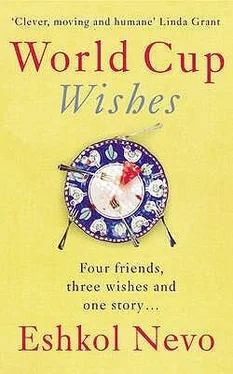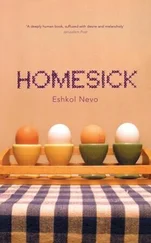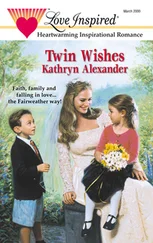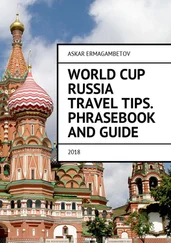Went mad, the poor bastard. I called him a few weeks ago. He didn’t come in with his book, like he did every year. So I wanted to see how he was. His wife answered. Told me that he was institutionalised in Tirat HaCarmel. She committed him. I had no choice, she said. He bought an aquarium the size of a wardrobe and decided he was going to live inside it. For two months, he lay there in the living room, in the aquarium, ate his meals there, slept there. Wrote there. Watched TV from there. Can you imagine? In the end, she couldn’t handle it any more and committed him.
Wow.
She says it’s because of what happened to him in the concentration camp. That he never managed to get over it. I don’t think so. I think that anyone who sits at home all day and does nothing but write, doesn’t go out to work and doesn’t see people, is bound to go mad in the end.
I nodded hesitantly and remembered what Ofir had said about the yawning abyss of fear lying in wait for every artist. I put my foot on the bundle of papers I’d put under the chair and squashed it down hard in the hope it would shrink. Shrink until it disappeared.
So what … what did you want to ask me? my father said, putting the cheques aside and starting to work on a stack of receipts.
The hero of an American TV series would probably have said, ‘Never mind’, creating the bitter-sweet effect of missed opportunity and stretching the plot out a bit more, another episode, even another season, if the ratings were high enough. But I–I had the World Cup on my mind.
I wrote a book, Dad, I said. And then I picked up the manuscript and put it on the desk.
And … You want me to print it for you? he asked without looking up from the receipts.
Yes … If it isn’t too complicated.
It isn’t too complicated, he said. His tone was suspiciously matter-of-fact.
I’ve spoken to the big publishers in Tel Aviv, I explained, and they just work terribly slowly.
And what’s your hurry, if I may ask?
I have to publish the book within a month and a half from today. I simply have to.
O-k-a-a-a-a-a-y, my father stretched out the short word as much as he could. And took out his order book. How many pages do you have?
One hundred and ninety-two, at the moment.
One-and-a-half line spacing?
Yes.
You’ve already done the copy-editing?
No.
I’m surprised at you, son. Didn’t you work here for an entire summer? You know I can’t start working before you finish the copy-edit. Give it to that friend of yours, the one who married Ya’ara. He must have a lot of time now since they threw him out of the prosecutors’ office.
They didn’t throw him out, he left.
Whatever you say, just ask him. It’ll save you money. How many copies of the book do you need?
Four.
You’re joking! What do you mean, four copies? Don’t you want your book to reach the shops?
Not exactly.
Then why … never mind. You know what, it’s none of my business. But take into account that the smallest edition I can print for you is the ‘poetry edition’ of three hundred copies. And yours isn’t a book of poetry, if I’ve understood correctly.
No, it isn’t.
Actually, it doesn’t matter. It’s your book and … you can do what you like with the copies you don’t need. For all I care, you can throw them into the rubbish bin.
OK.
How soon did you say you need it? A month and a half? That’s a bit tight. Textbook season begins next week. It’s going to be a madhouse here.
He wrote a few numbers in his notebook, humming to himself, then took out a calculator and resumed the calculations he had made in his notebook (he always did the numbers twice, to be on the safe side. And it was always the calculator that served as back-up to the more reliable by-hand reckoning).
The Roland continued working. I inhaled the thick, sweet smell of the print. When I was a child, I was ashamed of that smell that stuck to all my shirts, but now I realised that I missed it. I suddenly remembered our only family trip abroad, classical Europe in ten days. We walked along the streets of a large city — Munich? Vienna? — and he suddenly left us and began walking, then running, in the opposite direction. Later, it turned out that he thought he heard a printing press working, and he had to, simply had to, find where the click-clacking noise was coming from and see whether it was a Roland or a Heidelberg. Are you completely out of your mind? my mother had asked him when he came back. And he didn’t answer her. The silence between them lasted until we reached the hotel.
Now he shifted his glance from the calculator to me. I’ll do my best, he said, adding: it’ll help if you get the copy-editing done this week.
That’s great, thanks, I mumbled, finding it hard to understand his response. None of the cries of despair I had expected. No hair pulling. Strangely enough, he even seemed to be slightly pleased.
I also wanted to ask you for something, he said, leaning forward a little in his chair.
Here it comes, I thought, sighing silently in relief, here’s the price tag. He pulled out a small orange Post-it and wrote a phone number on it. I want you to call Yanke’le Richter. You remember him? He sat next to us at Ya’ara’s wedding. I want you to ask him where the best place is to retrain for a career in the hi-tech industry. And I’m asking you to enroll there.
I nodded in submission. My father is a businessman, and I had imagined that he’d ask for something like this in exchange for agreeing to print my book. I took the Post-it, hoping that because of the slowdown in the field, even if there were courses, they wouldn’t begin for a long, long time.
Then I stood up.
He took the manuscript from me and weighed it in his hands. Well done, son, he said and suddenly patted me on the shoulder. Writing a book is not easy, not easy at all.
That was the first time he’d had anything good to say about me since I left home, and another sort of pride, not about business, shone in his eyes.
I’m thirty-two years old. I have spent the last ten years desperately trying to be different from him. I went all the way to Tel Aviv so that I wouldn’t end up, God forbid, inheriting the printing house and becoming a replica of him, developing his suspiciousness, his asceticism, his open scorn for anything that yielded no monetary profit –
And yet, when he made that short, complimentary remark, I felt a rare flutter of satisfaction.
Writing a book is not easy, I repeated his words as I wound my way down towards the sea on Freud Street. It’s not easy, but I did it. I moved. I came out of my corral and galloped forward for two months. Without running out of oxygen. True, it was for Ofir. And true, it was for the matrix of the World Cup notes. But if I did it once — that means I can do it again. I can escape from the chains of myself. From the mire of my pessimism. From my scepticism and restraint. I can make new wishes for the 2006 World Cup, and, this time, make them come true. I can change. Find myself. Find a purpose. I can love a woman other than Ya’ara. I can — now that the sea is opening before me in all its sparkle — I can even keep being my friends’ friend in the future, not just freeze them in time in my writing. Yes, soon their lives are going to be very different from mine, but that doesn’t mean my book is destined to be a requiem.
*
When you drive fast on Road No. 2, which is the number one road in my life, the landscape races past the window and you don’t see the different shades of green or the fields on the way out of the city, you don’t see the flocks of birds flying in swift-changing formations over the fish ponds of Maagan Michael or Jisar a-Zarka, the wretched, depressed village where, a few months ago, someone threw a concrete block from the bridge that crosses over this road, but you don’t remember that block and, in fact, you don’t remember anything about the past because your thoughts are liberated from it and race confidently towards what has not yet happened, to what will happen, and between Zichron Yaakov and Hadera, you forget the road completely, forget you’re driving, because you suddenly think that, even though there will be only four copies of the book, you should still make a few changes and disguise a few things, change names and places and physical descriptions so people won’t be needlessly hurt, and perhaps you should even add relevant passages from the philosophy thesis, save it from total annihilation. The imperious Ikea sign rises high not far from the South Netanya junction, but you don’t see that either because at that exact moment, you suddenly realise that apart from the necessary disguising and additions and fact-checking, like for example, which teams played in the various World Cup finals, your book still needs an appropriate closing scene, and as you approach Herzliya, you amuse yourself with several possibilities for such a scene. One of them includes the timid girl, lying beside you on a towel on the beach at Gaash, and another takes place in the year 2022, in the stadium stands at the World Cup that Israel has finally managed to host, and all your friends drive there to watch the game together, but when you pass the Kfar Shmariyahu junction now, the only possible final scene, the truly appropriate one, crops up or blows in through the window with the wind. When you reach home, you turn on the computer and write:
Читать дальше












